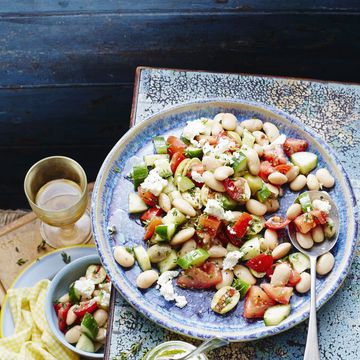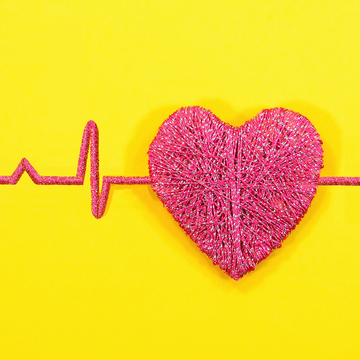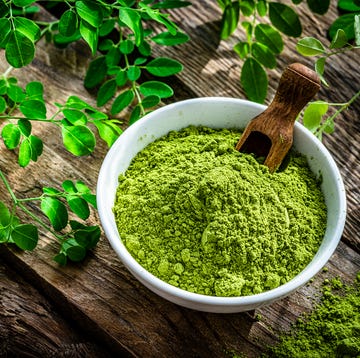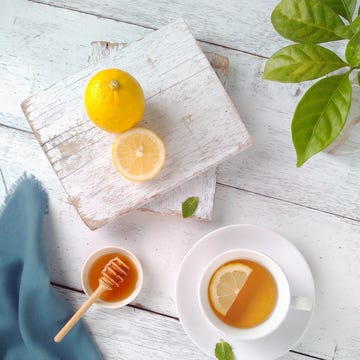Do a quick search of kombucha online, and you’ll find people claiming that the fizzy drink (which is produced by fermented tea, sugar, fungi, and bacteria) supposedly supplies sky-high energy, quells pain, fends off certain cancers, detoxes your body, helps you shed weight, and turns your immune system into a fortress.
It would be amazing if one beverage could do all of that. Yes, kombucha can support your health, but is it really a health elixir in a bottle? Here are five things to keep in mind before you take a swig of the fermented beverage.
Kombucha isn't a miracle worker.
"I would be wary of calling kombucha a remedy or a magic food," says Maggie (Neola) Tagare, RD, LD, a dietitian in the Washington, DC, area. After all, glorifying one food over another (kale is king!) isn’t the way nutrition works. A healthy diet is all about variety — no one food can provide adequate amounts of all the nutrients your body needs to function at its best.
Yes, it's chock-full of probiotics.
As with any tea, kombucha serves up a slew of healthy antioxidants and polyphenols, Tagare says. "But because it’s fermented, you see more of that probiotic push in kombucha." And that’s where most of the drink’s health benefits lie: probiotics, a.k.a. good gut bacteria.
"The gut microbiome is often called the forgotten organ — it’s really important to foster that health," says Tagare. After all, a healthy gut microbiome can help fend off issues like diarrhea and IBS and help your whole body function at its best. Fermented foods like kombucha may also improve the health of your intestinal cells, boost your immune function, and cut your risk of allergy and chronic disease, says Tagare.
We have a pasteurization conundrum.
Kombucha’s probiotics can also come with a downside. That’s because some kinds of the drink are unpasteurized — and thus, you run the risk of a seriously upset stomach, says Keri Gans, RD, the author of The Small Change Diet. Or worse: "Without pasteurization, you run the risk of harmful microorganisms taking over and causing serious problems, including food poisoning," says Ryan Andrews, RD, a fitness and nutrition coach with Precision Nutrition.
But here’s the thing — in order to reap kombucha’s probiotics benefits, the drink likely needs to be unpasteurized. "Pasteurization kills off both harmful and helpful bacteria, so any potential beneficial probiotics would be gone as well," Andrews explains.
There's not much research on kombucha's effects.
Past packing a probiotic punch, just how much (and how) kombucha can keep you well is a bit murky. While some studies — like one from 2014 in The Journal of Medicinal Food — have suggested kombucha tea can protect against toxic molecules called free radicals and promote immunity, most of the (incredibly limited) research on the topic is done with animals. And many of the purported health benefits stem from proponents of the beverage, not science itself.
You can get probiotics elsewhere.
Probiotics are a key part of a healthy diet. In addition to kombucha, they can also be found in other fermented foods such as some Greek yogurts, kimchi, sauerkraut, miso, and certain cheese.
If you want to get probiotics from kombucha, that’s fine, but if you’re going to drink the raw (unpasteurized) version, make sure to buy your kombucha from a reputable company, says Gans. She also suggests pregnant woman and kids steer clear of the beverage. There’s a risk of bacteria and kombucha can have trace amounts of alcohol, thanks to the fermentation process.
How to choose a kombucha
If you're ready to try this fizzy drink, here are some brands we love:
Remember, too: "Not all kombuchas are created equal," says Tagare. "Some are loaded with added sugars." So make sure to read your label — and the serving size amount!" Or, try brewing it yourself with a kombucha starter kit like this one. We also have easy-to-follow instructions for newbies.
Other ways to boost your body's probiotics
Not into kombucha? "Filling up on veggies, fruit, 100% whole grains, nuts, seeds, and pulses can help you boost immunity and provide some important prebiotic fiber that helps your body’s own probiotics to thrive," adds Jaclyn London, MS, RD, CDN, the author of Dressing On the Side. "Your best bet is to add more of those foods wherever you can, since one food or drink in isolation isn't a cure-all. Bottom line: Choose kombucha for flavor, not just its health benefits."
Laura Iu, R.D., is a registered dietitian nutritionist, certified intuitive eating counselor, yoga guide, and owner of Laura Iu Nutrition, a private practice in New York City. She earned her Bachelor of Science in Nutrition and Dietetics from New York University and completed her internship in dietetics at Weill Cornell & Columbia Medical Center of New York-Presbyterian Hospital. She went on to work in New York City’s top hospitals, including Mount Sinai Hospital and NYU Langone Health. She believes that true health is all encompassing — physical, emotional, and mental wellbeing — not an external measure via shape or size.












